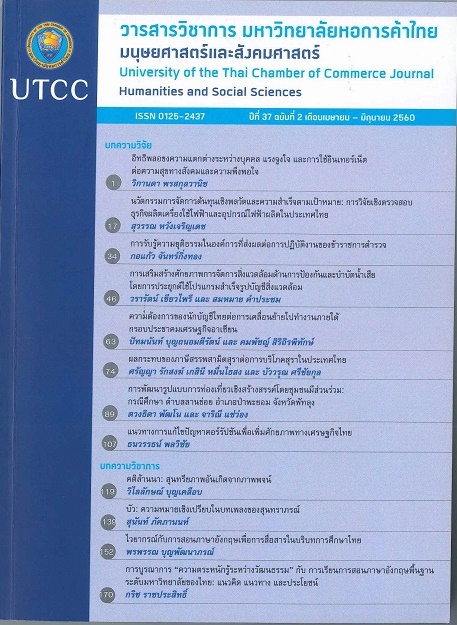การรับรู้ความยุติธรรมในองค์การที่ส่งผลต่อการปฏิบัติงานของข้าราชดำรวจ
Main Article Content
บทคัดย่อ
ในการทำงานนั้นบุคคลมักคาดหวังถึงผลลัพธ์ที่ได้ลงทุนไปในการทำงาน หากบุคคลเกิดการรับรู้ผลตอบแทนที่ได้รับไม่สมดุลกับสิ่งที่ได้ทำให้แก่องคืการ บุคคลย่อมเกิดความรู้สึกถึงความไม่ยุติธรรม ซึ่งส่งผลต่อการแสดงพฤติกรรมทางลบและกระทบต่อผลปฏิบัติงานของบุคคลนั้น อันจะส่งผลเสียต่ององคืการในที่สุดการวิจัยครั้งนี้มีวัตถุประสงค์เพื่อ 1) ศึกษาระดับการับรู้ความยุติธรรมในองค์การของข้าราชการตำรวจ และ 2) สร้างสมการพยากรณ์การรับรู้ความยุติธรรมในองค์การที่ส่งผลต่อการปฎิบัติงานของข้าราชการการตำรวจ กลุ่มตัวอย่างที่ใช้ในการวิจัย คือข้าราชการที่ปฎิบัติงานในภาคใต้จำนวน 369 คน ผู้วิจัยใช้แบบสอบถามในการเก็บรวบรวมข้อมูล มีค่าความเชื่อมั่นของเครื่องมือวิจัยที่ระดับ 0.72-0.95 วิเคราะห์ข้อมูลโดยใช้การวิเคราะห์การถดถอยพหุคุณแบบสเตปไวส์ (Stepwise Mutiple Regression Analysis) และสร้างสมการพยากรณ์ ผลการวิจัยพบว่า ข้าราชการตำรวจมีระดับของการรับรู้ความยุติธรรมในองค์การทั้งในภาพรวม และรายด้านทั้ง 3 ด้าน (ความยุติธรรมด้านการแบ่งปันผลตอบแทนขององค์การ ความยุติธรรมด้านกระบวนการขององค์การ และ ความยุติธรรมด้านปฎิสัมพันธ์ระหว่างบุคคลกับองค์การ) จัดอยู่ในระดับสูง และ จากการวิเคราะห์ข้อมูลโดยใช้การวิเคราะห์ถดถอยพหุคูณแบบขั้นตอน พบว่า มีสองตัวแปรที่สามรถพยากรณ์การปฎิบัติงานของข้าราชการตำรวจได้ คือ ความยุติธรรมด้านกระบวนการขององค์การ (X2) และความยุติธรรมด้านปฎิสัมพันธ์ระหว่างบุคคลกับองค์การ (X3) โดยมีค่าสัมประสิทธิ์พหุคูณ (R) เท่ากับ .48 และมีค่าอำนาจในการพยากรณ์ร้อยละ22.9 โดยทั้ง 2 ตัวแปรสามารถพยากรณ์การปฎิบัติงานของข้าราชการตำรวจได้อย่างมีนัยสำคัญทางสถิติที่ระดับ.001 และ0.5 ตามลำดับ โดยสามารถเขียนสมการพยากรณ์ไปรูปคะแนนดิบได้ ดังนี้ Y = 2.670 + .236 X2 + .093 X3
Article Details
ลิขสิทธิ์ของบทความ
ผลงานที่ได้รับการตีพิมพ์ถือเป็นลิขสิทธิ์ของมหาวิทยาลัยหอการค้าไทย ห้ามมิให้นำเนื้อหา ทัศนะ หรือข้อคิดเห็นใด ๆ ของผลงานไปทำซ้ำ ดัดแปลง หรือเผยแพร่ ไม่ว่าทั้งหมดหรือบางส่วนโดยไม่ได้รับอนุญาตเป็นลายลักษณ์อักษรจากมหาวิทยาลัยหอการค้าไทยก่อน
เอกสารอ้างอิง
Cropanzana,R,Bowen,D.E,& Gilliland,S.W.(2007). The management of organizational justice. Academy of Management Perspectives, 21(4), 34-48.
Devonish.D. & Greenidge.D (2010). The effect of organizational justice on contextual performance, counterproductive workbehaviors, and task performance:investigating the moderating role of abilitybasedemotional intelligence. International Journal of Selection and Assessment, 18(1), 75-86.
Greenberg. J., & Baron.R.A.(2003). Behavior in Organizations (8th ed.). Upper Saddle River,NJ: Pearson Education.
Jadkrabuanpol,S. (2013). Fairness to the police, who acted in the southern region deserve. Retrived May 28,2016,form https://www.matichon.co.th/news_detail.php? newsid=1369132795 (in Thai).
Jankinthong, K.(2015).The influence of individual, group, and organizational behaviors on the performance of policestations regarding their task of providing public security. University of the Thai Chamber of Commerce Journal, 34(3), 31-41. (in Thai).
Kannika ,N.(2005X Seminar Thailand policeto the expectations of society. In K.Kittayarak ( Ed.) ,The results of the
public hearing (pp. 19-32). Bangkok,Thailand: The Office of Secretariat Police Development Commission. (in Thai).
Kreeitner,R.,&Kinicki,A.( 2004). Organizationalbehavior (6th ed). New York: McGraw -Hill.Motowidlo,S.J.,Borman,W.C.,&Schmit, M. J. (1997). A theory of individual differences in task and contextual performance. Human Performance, 10(2),71-83.
Nasurdin, A. M., & Khuan, S. L. ( 2007). Organizational justice as an antecedent of job performance. Gadjah Mada International Journal of Business, 9(3),335-353.
Robbins, S.P .(2003) Organizational behavior (10th ed.) upper Saddle River, NJ: Pearson Education.
Siriyasub, Y. (2015). Organizational climate and job satisfaction: variables predicting efficiency in work performance. University of the Thai Chamber of Commerce Journal, 35(4), 114-131. (in Thai).
Thailand. Ministy of Justice. Committee of Police Development Commission.(2007). Report of the feedback from all sectors... ....Open stage for the police restructuring. Nonthaburi, Thailand: National Buddhism. (in Thai).
Van Scotter, J. R.(2000). Relationships of task performance and contextual performance with turnover, job satisfaction,and affective commitment. Human Resource Management Review, 10(1), 79-95.
Wang, X.,Liao, J,Xia,D.,& Chang,T. (2010). The impact of organizational justice on work performance: mediating effects of organizational commitment and leader-member exchange. International Journal of Manpower, 31, 660-677.


